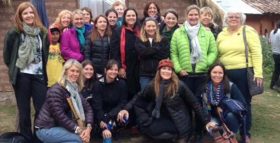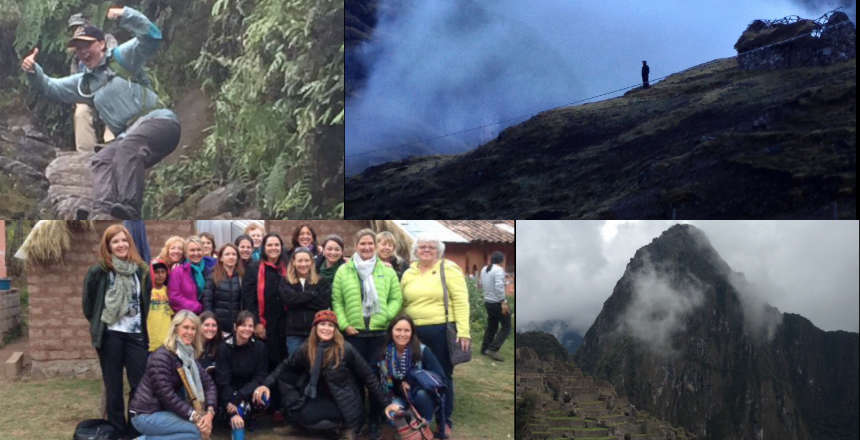My mother and I used to laugh so hard that tears would stream down our faces. We laughed for so long, that our ribs would ache and we would gasp for air. I have rarely laughed like that since my parents were killed in a plane crash 13 years ago. It’s not that I don’t find humor in my life; I just find it harder to access that boundless joy.
That changed a few weeks ago, when I traveled to Peru with a multi-generational and international group of women who lost their mothers or both of their parents. Our leaders on this journey were Hope Edelman, author of “Motherless Daughters” and Allison Gilbert, author of “Parentless Parents.” (Read a Modern Loss Q&A with Edelman and Gilbert here.) They teamed up with Trekking for Kids, a service travel organization. Each participant was expected to raise a minimum of $1,000 and volunteer at Niños del Sol, an orphanage located in rural Peru. We also trekked days through the Andes — a long and grueling endeavor — until we finally arrived at Machu Picchu.
Niños del Sol was a revelation to me. The 23 children who lived there knew joy and empathy, and their orphanage, nestled in the Sacred Valley of Peru, was a peaceful oasis filled with laughter. The co-directors, Avishai Pearlson and Viviana Martinez, worked tirelessly to create a healing environment for the children by teaching them yoga and meditation, and providing them with an education, exposure to art, and a variety of social and recreational activities. (You can find more information about the origins of the orphanage here.)
Whereas I had spent years building a protective fortress around myself — refusing to be pitied and cared for by members of my community when I was orphaned — each child thrived in the care of the dedicated orphanage staffers, and rejoiced in the company of our group.
Related
These children will never be placed outside Niños del Sol. The orphanage is their home, filled with numerous brothers and sisters, and replete with nourishing meals, bunk beds and pillow fights, daily chores — and unconditional love. As much as I admired the children of Niños del Sol for their strength of spirit, I also envied their expressions of unbridled joy.
On our first day of trekking, a local shaman performed a blessing ceremony for us. He handed each woman three coca leaves that we were instructed to hold between the thumb and forefinger of our right hands. As he chanted, each woman was told to walk in front of him and hold in her mind a wish that she had for herself or a loved one, and then hand him our leaves. When my turn came, I watched him blow on my leaves, dip them into wine, and bless them.
Within seconds, I felt an electric jolt of energy flood through me, and something became unleashed. My tears flowed so easily and for so long that I walked away from the group, embarrassed. Was it possible that the combination of my wish and the shaman’s blessing opened up an emotional channel that I had shut down years ago? Was my wish — to have my heart healed and to let me experience joy again — predicated on revisiting my sorrow?
With each step that I took on that day, I imagined the stony armor I used to protect myself from the world of happy families who still had parents beginning to crack, bits of it falling away as I climbed higher and higher into the Andes, buoyed by the common bond I shared with the women in my group. Almost all of us knew what it was like to experience the death of a parent at a young age. We all knew that grieving never ends; it merely changes form.
Later that evening during our first night in camp, my roommate, Jo, and I were exhausted as we fumbled in our dark tent lit only by our headlamps. As we struggled to figure out which end of our sleeping bags to crawl into, we began to laugh. We laughed about the infernal mess in our tent, the obnoxious glare of my headlamp every time I’d look at Jo, the sound of the horses snuffling nearby, and our complete inability to zip our tent closed. We laughed so hard and for so long, that neither of us could make any intelligible sounds. Finally, when we came to our senses, I realized that my wish had come true.
Can you see me, Mom? I wondered. I’m here because of you and Dad. Are you both with me now?
After completing our trek, we returned to the orphanage for a farewell party. A 9-year old boy named Luis took me to see his room where his new coat was hanging on his bedpost, his new shoes were neatly lined up on a shelf, and his bed was made with brand new sheets — all things that we had bought together a week earlier. Never once did he let go of my hand, even when he shyly asked me whether I was an orphan like him. I nodded my head and he squeezed my hand a little tighter. Luis knew. At 9, his heart hadn’t been hardened and jaded by time.
As we stood together in that simple room with Luis’s life just beginning to unfold and mine nearly halfway finished, I realized that after 13 years, I was beginning to heal.
Katherine Maguid lives in Boulder, Colo., and earned her M.F.A. in creative nonfiction from Antioch University in 2006. Her writing has appeared in Writing on the Edge, Women’s Adventure Magazine, and Marathon & Beyond, among other publications. She is working on a memoir about the year after her parents were killed.












